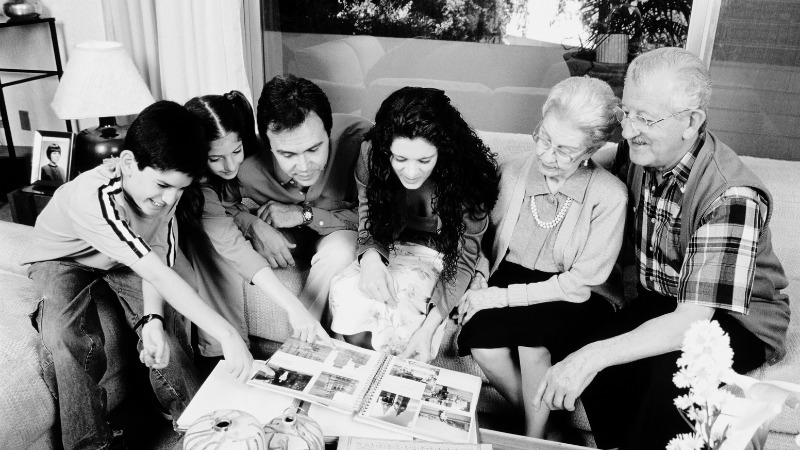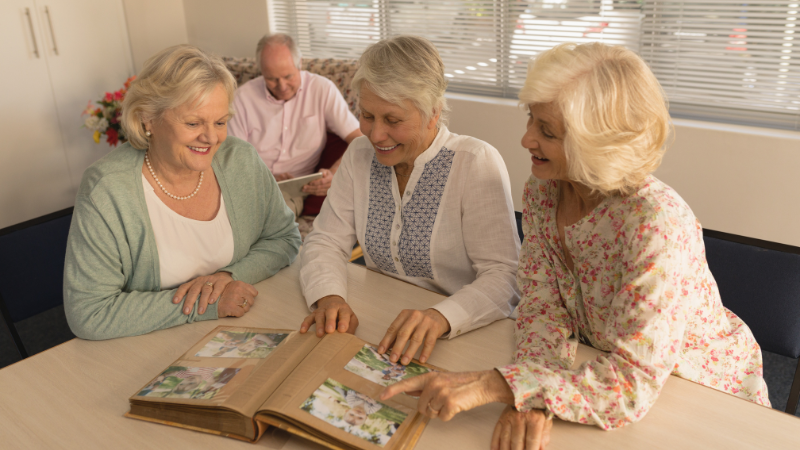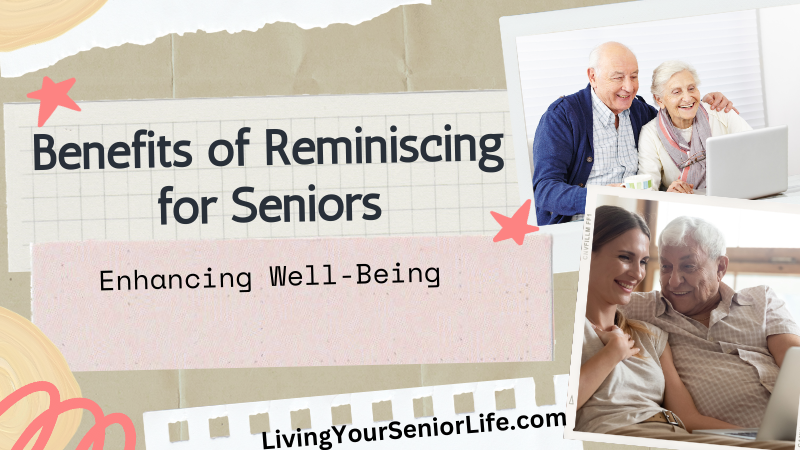In the tapestry of life, our memories are the threads that weave together our experiences, shaping the very fabric of who we are. For seniors, the act of reminiscing holds a profound significance, offering a portal to the past and a treasure trove of benefits for the mind, heart, and soul.
As we journey through the golden years, reminiscing becomes more than just a stroll down memory lane—it becomes a powerful tool for nurturing cognitive function, fostering emotional well-being, and strengthening social connections. In this blog post, we delve into the timeless benefits of reminiscing for seniors, exploring how this seemingly simple act can enrich their lives in myriad ways.
From enhancing cognitive abilities to elevating mood and fostering a sense of purpose, the act of reminiscing offers a myriad of rewards. Join us as we uncover the hidden gems of reminiscence therapy and celebrate the timeless treasure of memories that continue to illuminate the path for seniors everywhere.
So, let us embark on this journey together, as we unravel the tapestry of reminiscing and discover the myriad ways it enriches the lives of seniors, one cherished memory at a time.
Key Takeaways:
- Reminiscing can improve cognitive function and memory in seniors.
- Engaging in reminiscence activities can foster a sense of purpose and meaning in older adults’ lives.
- Sharing memories with others can strengthen social connections and reduce feelings of loneliness in seniors.
Enhanced Cognitive Function

Engaging with the past isn’t just nostalgic; it is a crucial exercise for the brain. Particularly for seniors, recounting life stories, sifting through old photographs, and discussing past experiences are instrumental in keeping the mind active and limber.
Tackling Dementia through Reminiscing
For those living with dementia, which includes Alzheimer’s disease, reminiscence therapy can create significant improvements in cognitive function. Guided conversations about past events, facilitated by family members or caregivers, not only stir up happy memories but encourage a form of mental gymnastics. These reminiscence sessions sharpen both long-term and short-term memory while providing a soothing familiarity that can ease negative emotions.
Memory Lane and Cognition
For older people in general, traveling down memory lane is a great way to stimulate cognition. Whether it’s discussing their first job, humming along to favorite songs, or laughing about old movies, each activity prompts the brain to revisit older memories and possibly form new pathways. Engaging in reminiscence group sessions or one-on-one time with a family member about varied life experiences—from favorite foods to holiday traditions—can lead to deeper connections and an improvement in communication skills, ultimately enhancing the overall quality of life for seniors.
- Engaging in reminiscing activities stimulates the brain, improving memory recall and cognitive abilities.
- It’s a great way to support cognitive function in dementia patients and those with Alzheimer’s disease
Emotional Well-Being
Engaging in reminiscence can play a significant role in enhancing the emotional well-being of seniors. By revisiting past experiences and happy memories, older adults can combat feelings of depression and stress, fostering a more positive psychological health.
Combating Depression
For many seniors, reminiscence sessions serve as a great way to combat depression. Recalling pleasant memories, whether it’s their first job, favorite songs, or moments spent with family members, can ignite feelings of joy and contentment. Studies suggest that sharing life experiences can lead to significant improvements in the mental health of dementia patients as well as of those without cognitive impairments. Reflecting on positive memories helps to shift focus away from negative emotions that are often associated with depression.
Nostalgia and Psychological Health
Nostalgia, especially when shared with family members or during reminiscence group activities, has been linked to enhanced psychological well-being in older people. Discussing family history, flipping through photo albums or revisiting familiar places can lead to meaningful conversations that alleviate feelings of social isolation.
The American Psychological Association notes the positive effects of reminiscence therapy, indicating that it can improve both communication skills and cognitive function, thereby contributing to a better quality of life.
- Reflecting on past experiences can evoke positive emotions, leading to increased feelings of happiness and satisfaction.
- Dwelling on pleasant memories of familiar places or favorite movies can lead to greater satisfaction in everyday life.
- Past experiences with family members can foster meaningful conversations and good social interaction.
Daily Lifestyle and Recreational Activities
A trip down memory lane can revitalize older adults’ daily lifestyle by reintroducing hobbies and activities that once brought them joy. Reminiscing can also be incorporated into various recreational activities that promote physical movement and exercise. For example, seniors can take leisurely walks while reminiscing about past experiences or participate in group outings to nostalgic locations, combining physical activity with mental stimulation.
Improved Communication Skills

Building Communication and Family Bonds
When older adults share happy memories with their families, it’s more than just a nostalgic trip down memory lane. Old photographs and stories from an older relative’s first job or favorite songs provide a wealth for family members to explore. Not only does this stimulate mental activity, but it can also help bridge the gap between future generations and give them a sense of family history. Moreover, discussing life experiences can lead to meaningful conversations on a deeper level, strengthening the bonds within the family.
- Sharing stories and passing down family history through reminiscing helps seniors leave a lasting legacy for future generations.
Life Review
Revisiting past events offers seniors an opportunity to evaluate their life journey, find meaning, and gain wisdom from their experiences.
Reminiscing serves as a powerful tool for life review, allowing seniors to reflect on their past experiences, achievements, and challenges in a meaningful and introspective way. This process of introspection and self-evaluation can lead to a deeper understanding of one’s life journey, as well as a greater sense of personal growth and fulfillment. Here are some specific benefits of reminiscing on life review:
Sense of Accomplishment:
- Reminiscing allows seniors to recall and celebrate their accomplishments, both big and small, throughout their lives. By revisiting past achievements, they can gain a sense of pride and satisfaction in all that they have accomplished over the years.
Acknowledgment of Challenges:
- Reminiscing also provides an opportunity for seniors to acknowledge and process the challenges and obstacles they have faced throughout their lives. By confronting difficult memories and experiences, seniors can gain insight into their own resilience and strength.
Integration of Life Lessons:
- Through reminiscing, seniors can reflect on the lessons learned from their past experiences and apply them to their present circumstances. This integration of life lessons can lead to personal growth and development, as well as a greater sense of wisdom and perspective.
Closure and Acceptance:
- Reminiscing allows seniors to revisit past relationships, decisions, and events, providing an opportunity for closure and acceptance. By making peace with the past, seniors can move forward with a renewed sense of clarity and purpose.
Identification of Values and Priorities:
- Reflecting on past experiences can help seniors identify their core values and priorities in life. By discerning what truly matters to them, seniors can make more informed choices and live with greater intentionality and authenticity.
Legacy Preservation:
- Reminiscing allows seniors to reflect on the legacy they wish to leave behind for future generations. By sharing stories, wisdom, and life lessons with loved ones, seniors can ensure that their values and experiences are passed down and remembered for years to come.
Overall, reminiscing serves as a valuable tool for life review, enabling seniors to gain insight, find closure, and cultivate a greater sense of purpose and fulfillment as they reflect on their life journey. Through this process of introspection and self-discovery, seniors can embrace the richness and complexity of their life stories, finding meaning and inspiration in the memories that have shaped them.
Mood Elevation

Reminiscing serves as a powerful catalyst for mood elevation among seniors by evoking positive emotions and fostering a sense of nostalgia and happiness. As individuals reflect on past experiences, they often recall cherished moments, achievements, and relationships that bring joy and fulfillment.
These positive memories have the ability to uplift mood and alleviate feelings of sadness or loneliness that seniors may experience. Whether reminiscing about significant life events, happy times with loved ones, or personal achievements, these recollections can elicit smiles, laughter, and a general sense of contentment.
Moreover, reminiscing allows seniors to focus on the positive aspects of their lives, shifting their perspective from current challenges to past triumphs and moments of joy. This shift in focus can lead to an improved outlook on life and a greater appreciation for the richness of their experiences.
Sense of Purpose
Reminiscing plays a significant role in helping seniors cultivate and maintain a sense of purpose as they reflect on their past experiences and accomplishments. As individuals age, they may face transitions such as retirement or changes in health that can sometimes lead to a loss of direction or identity. Engaging in reminiscing activities provides seniors with an opportunity to reconnect with their personal history, values, and the impact they have made throughout their lives.
By revisiting past achievements, challenges overcome, and meaningful moments, seniors can reaffirm their sense of purpose and recognize the value of their contributions to family, community, and society. Reminiscing allows them to see the continuity and significance of their life’s journey, highlighting the roles they have played and the impact they have had on others.
Moreover, reminiscing can inspire seniors to set new goals or pursue activities that align with their interests and passions. By reflecting on past experiences, they may discover untapped talents, interests, or opportunities for personal growth and fulfillment. This renewed sense of purpose can energize seniors and provide them with a renewed sense of motivation and enthusiasm for life.
Social Connection

In senior living communities, reminiscence is a wonderful way to encourage socialization. Whether through group sessions focused on old movies, favorite foods, or holiday traditions, sharing old memories can provide a sense of community among residents. Such activities can reduce feelings of social isolation and are especially beneficial for those with cognitive impairments or memory loss. Engaging in these reminiscence sessions ensures great conversations and can foster new friendships, thereby improving the overall quality of life and mental health of elderly people.
Engaging in reminiscence can significantly enhance the social well-being of older adults. By sharing past experiences and memories, seniors can deepen their connections with others and bolster their communication skills.
- Sharing memories with others fosters social bonds and strengthens relationships, combating feelings of loneliness and isolation.
Stimulation of Senses
Reminiscing can evoke sensory memories, such as the smell of a favorite meal or the sound of a familiar song, providing a multi-dimensional experience. Overall, the stimulation of senses during reminiscing provides numerous benefits for seniors, including enhanced memory recall, emotional connection, improved mood, cognitive stimulation, sensory exploration, and social connection. By engaging the senses during reminiscing, seniors can enjoy a richer, more immersive reminiscing experience that enhances their overall well-being and quality of life.
Sustaining Self-Esteem
Reminiscing is not just about looking back on happy memories; it’s also about celebrating accomplishments and sustaining self-esteem. Reflecting on significant life events such as one’s wedding, the pride of a first job, or the joy of family gatherings helps older adults reconnect with their personal history and family history, passing on valuable memories to future generations.
Validation of Life Experiences: Reminiscing allows seniors to reflect on their past achievements, successes, and milestones, which serves as a validation of their life experiences. By revisiting moments of triumph and accomplishment, seniors can reaffirm their sense of self-worth and recognize the value of their contributions throughout their lives.
Recognition of Personal Growth: Through reminiscing, seniors can acknowledge their personal growth and development over time. By recalling past challenges and obstacles they have overcome, seniors can appreciate their resilience, strength, and capacity for growth, thereby boosting their self-esteem and confidence.
Celebration of Identity and Individuality: Reminiscing provides seniors with an opportunity to celebrate their unique identity and individuality. By sharing stories and memories that reflect their interests, values, and personality traits, seniors can embrace their sense of self and feel proud of who they are, enhancing their self-esteem.
Affirmation of Relationships: Reminiscing often involves recalling cherished moments spent with loved ones, which can affirm the importance of relationships in seniors’ lives. By revisiting memories of meaningful connections and shared experiences, seniors can feel valued, loved, and supported, bolstering their self-esteem and sense of belonging.
Sense of Purpose and Meaning: Reminiscing allows seniors to find meaning and purpose in their past experiences and accomplishments. By reflecting on their life journey and the impact they have made on others, seniors can derive a sense of purpose and fulfillment, which contributes to their overall sense of self-esteem and well-being.
Stress Reduction
Reminiscing provides an opportunity for relaxation and stress relief as seniors revisit fond memories.
Distraction from Current Stressors: Reminiscing provides seniors with a welcome distraction from current stressors and worries. By focusing on past memories and experiences, seniors can temporarily shift their attention away from present concerns, allowing them to relax and unwind.
Sense of Comfort and Familiarity: Revisiting familiar and comforting memories can evoke feelings of security and well-being in seniors. Reminiscing about happy times spent with loved ones or in familiar places can provide a sense of comfort and reassurance, reducing stress and anxiety levels.
Positive Emotional Regulation: Reminiscing often involves recalling positive experiences and moments of joy, which can help regulate emotions and promote a sense of emotional well-being. By reliving pleasant memories, seniors can experience feelings of happiness, gratitude, and contentment, counteracting negative emotions associated with stress.
Promotion of Relaxation: Engaging in reminiscing activities can promote relaxation and stress relief in seniors. Whether reminiscing alone or with others, the act of reflecting on past experiences can have a calming effect on the mind and body, reducing tension and promoting a sense of peace and relaxation.
Perspective Shift: Reminiscing allows seniors to gain perspective on their life experiences and challenges, which can help reduce stress levels. By reflecting on past difficulties they have overcome and the lessons learned along the way, seniors can adopt a more positive outlook on life and approach current stressors with resilience and optimism.
By incorporating reminiscing activities into their daily lives, seniors can effectively manage stress and cultivate a greater sense of peace, resilience, and well-being.
Therapeutic Benefits
Reminiscence therapy is often used to address emotional issues and improve mental well-being in seniors.
Emotional Regulation: Reminiscing provides seniors with a safe and supportive environment to explore and process their emotions. By revisiting past experiences and expressing their thoughts and feelings, seniors can gain insight into their emotional responses and learn healthy coping strategies for managing difficult emotions.
Validation and Acknowledgment: Reminiscing validates seniors’ life experiences and acknowledges the significance of their memories and emotions. This validation can be particularly therapeutic for seniors who may feel marginalized or overlooked, as it affirms their worth and validates their feelings.
Resolution of Past Trauma: Reminiscing can help seniors process and come to terms with past traumas or difficult experiences. By revisiting these memories in a controlled and supportive environment, seniors can gain a new perspective, find closure, and begin the healing process.
Promotion of Self-Expression: Reminiscing encourages seniors to express themselves creatively through storytelling, art, music, or other forms of expression. This creative outlet can be therapeutic, allowing seniors to explore their thoughts and feelings in a nonverbal or symbolic way.
Overall, reminiscing offers a wide range of therapeutic benefits for seniors, including emotional regulation, validation, resolution of past trauma, promotion of self-expression, stress reduction, enhanced self-esteem, social connection and support, and cognitive stimulation. By incorporating reminiscing activities into their lives, seniors can experience improved emotional well-being, enhanced quality of life, and a greater sense of fulfillment in their later years.
Validation of Life Experiences
Reminiscing allows seniors to recognize and appreciate the significance of their life experiences, promoting a sense of fulfillment.
Recognition of Personal Growth: Reminiscing allows seniors to recognize and appreciate their personal growth and development over time. By reflecting on past experiences, challenges, and achievements, seniors can gain a greater sense of self-awareness and recognize how they have evolved as individuals.
Affirmation of Identity: Reminiscing validates seniors’ sense of identity and self-worth by affirming the significance of their life experiences. By revisiting memories that reflect their values, interests, and personal characteristics, seniors can feel a sense of validation and affirmation of who they are.
Acknowledgment of Contributions: Reminiscing acknowledges seniors’ contributions and impact on others throughout their lives. By recalling moments of kindness, generosity, and support, seniors can recognize the positive influence they have had on family members, friends, and their community, validating their sense of purpose and worth.
Validation of Emotions: Reminiscing validates seniors’ emotions by providing a safe space to express and explore their feelings. Whether reminiscing about joyful moments, moments of sadness, or moments of triumph, seniors can feel validated in their emotional responses and experiences.
Celebration of Achievements: Reminiscing celebrates seniors’ achievements, both big and small, highlighting their successes and accomplishments throughout their lives. By revisiting moments of triumph and victory, seniors can feel a sense of pride and validation in all that they have achieved.
Promotion of Self-Worth: Reminiscing promotes seniors’ self-worth and confidence by emphasizing their strengths, resilience, and capacity for growth. By reflecting on past challenges they have overcome and the lessons learned along the way, seniors can feel a renewed sense of confidence in themselves and their abilities.
Overall, reminiscing validates seniors’ life experiences by recognizing their personal growth, affirming their identity, acknowledging their contributions, validating their emotions, celebrating their achievements, connecting them with their legacy, and promoting their self-worth. By engaging in reminiscing activities, seniors can feel validated, affirmed, and valued for the richness and significance of their life journey.
Therapeutic Approaches to Reminiscence

In therapeutic settings, reminiscence is harnessed to provide a myriad of benefits for older adults, from enhancing cognitive function to fostering social interaction. Specific tools and methods like the careful selection of photographs or music can evoke vivid memories, creating comforting and emotionally safe avenues for patients with cognitive impairments.
The Role of Reminiscence Therapy
Reminiscence therapy is especially recognized by the American Psychological Association for its positive effects on individuals with cognitive impairments or memory loss, including those diagnosed with dementia or Alzheimer’s disease.
Reminiscence therapy is an intervention that encourages elderly people, especially those with cognitive conditions like dementia or Alzheimer’s disease, to reflect on their past experiences. This is a great way to stimulate mental activity and has shown positive effects on mental health. By engaging in reminiscence sessions, older adults can experience improvements in their quality of life by reconnecting with their own history.
Reminiscence sessions can be tailored to the individual, whether through music therapy, group sessions, or one-on-one time with a family member. By connecting with their past memories, older adults experience the therapeutic value of embracing their life review, which can lead to significant improvements in emotional well-being,
By engaging in reminiscence therapy, you offer a wonderful way for older relatives to reconnect with their past and combat cognitive decline, while also keeping short-term memory sharp. This form of mental engagement can result in specific improvements in areas like blood pressure, heart rates, and even managing depressive symptoms. Whether through life stories, wedding songs, or even the scent of pine needles, reminiscing can foster positive memories that reinforce one’s sense of self and great conversations on a deeper level.
- Involvement of Family Members: Family sessions enhance the therapy by including family members in reminiscence activities, like discussing family history or looking at old photographs together. This not only reinforces family bonds but also enables the transfer of valuable memories to future generations.
- Direct Benefits: Research suggests reminiscence therapy can lead to significant improvements in cognitive function, and can potentially slow cognitive decline. Communicating about life experiences allows older people to navigate through their long-term memory, which might help in retaining short-term memories better.
Music, with its ability to evoke a plethora of memories from favorite songs to holiday traditions, plays an integral role in Reminiscence therapy. Familiar tunes can be powerful conversation starters, triggering specific memories and emotions, leading to an increase in overall happiness and even influencing physiological states, such as calming heart rates and lowering blood pressure.
Utilizing Senses for Memory Recall
The five senses—sight, smell, touch, taste, and hearing—are pivotal in activating old memories. Techniques involving the senses are some of the best ways for sparking pleasant recollections in reminiscence therapy, and can be applied in both individual and group settings.
- Visual Aids: Old photos, photo albums, and viewing favorite movies or clips from old movies can be excellent visual aids to discuss past events.
- Auditory Stimulation: Playing favorite songs or music from a person’s first job or wedding song often stimulates memory lane, and can lead to deeper conversations.
- Olfactory Cues: Scents, such as the smell of favorite foods or pine needles from a Christmas tree, often trigger older memories. Recollecting such smells can help elderly people relive festive traditions or favorite moments from everyday life.
By anchoring therapy sessions in tangible, sensory experiences, you can support older adults in bringing past memories to the present, enhancing emotional well-being, and providing relief from negative emotions or social isolation. Engaging in reminiscence therapy by involving the five senses is a confident and effective path towards enhancing the quality of life for individuals with dementia or other cognitive impairments.
Engaging with these past experiences creates a tapestry of life experiences that contribute to a richer sense of quality of life for older adults, reinforcing the positive effects of keeping history alive through shared moments.
FAQs
What role does reminiscence play in the care of seniors with dementia?
For dementia patients, reminiscence therapy is a valuable tool. It helps by creating new pathways in the brain, utilizing older memories that can sometimes remain intact despite cognitive impairments like those found in Alzheimer’s disease.
What topics are most effective for engaging seniors in reminiscing sessions?
Topics such as family history, high school yearbook memories, or favorite movies can serve as wonderful conversation starters. These subjects are often tied to pleasant memories and can spark a deeper level of engagement, leading to significant improvements in overall mental and emotional states.
How do reminiscing activities benefit the cognitive function of older adults?
Activities that encourage seniors to walk down memory lane, like discussing their first job or favorite songs, can help maintain or even improve cognitive function, specifically targeting areas like short-term memory and focusing attention.
Conclusion
Connecting with family members over old memories — be it discussing your first job, favorite movies, or holiday traditions — can lead to meaningful conversations. This practice is not just a great way to combat social isolation; it can foster significant improvements in cognitive function. For dementia patients, these sessions can stimulate older memories, potentially aiding in managing memory loss.
When older adults walk down memory lane, they often uncover pleasant memories that enhance mental health and quality of life. As you share stories and thumb through photo albums, you infuse everyday life with fond memories, bridging generations and preserving valuable personal narratives for future generations.
So next time you visit an older relative, consider starting a conversation with open-ended questions about their earliest memories – it’s a good idea that could lead to great conversations and an enhanced sense of connection on a deeper level.









